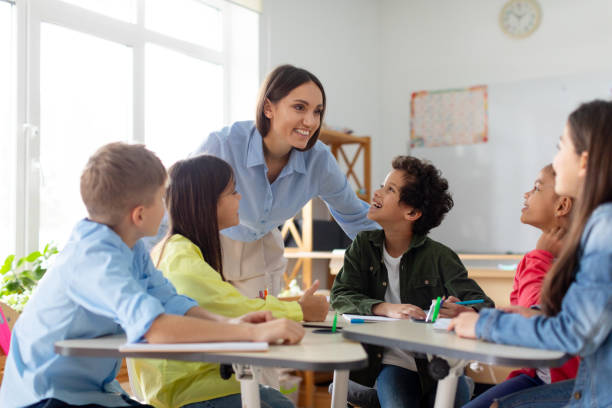
Empowering Gifted Students: Top Strategies for Educators to Foster Resilience and Confidence
Teaching gifted students isn’t just about academics; it’s about nurturing their emotional core. These students face unique challenges that require more than traditional approaches. Imagine seeing them thrive, not just intellectually, but emotionally. In this blog, you’ll uncover educator strategies that build resilience and confidence in gifted education. Empower your students, and watch them flourish. Ready to support their journey? Let’s explore these transformative strategies together.
Building Resilience in Gifted Students

Gifted students often face challenges that can impact their emotional resilience. Recognizing these challenges is the first step toward providing support. Encouraging emotional expression is another critical component, allowing students to process their feelings in a healthy manner.
Recognizing Unique Challenges
Gifted students experience unique pressures, including high expectations and social isolation. These pressures can lead to anxiety and stress. Understanding these challenges is essential for educators and guardians.
Gifted students may feel different from their peers, leading to a sense of alienation. They might also face unrealistic expectations, causing them to fear failure. Recognizing these pressures is vital in helping them build resilience. This resource provides insights into these emotional needs.
Consider the case of a student excelling academically but struggling socially. This student might benefit from a tailored approach that recognizes both their academic and emotional needs. Providing targeted support can help them navigate their unique challenges effectively.
Encouraging Emotional Expression
Encouraging gifted students to express their emotions can be transformative. Emotional expression allows students to process their feelings and build resilience against stressors.
Educators can create environments where students feel safe to share their emotions. This approach fosters trust and understanding, essential for emotional growth. The National Association for Gifted Children offers strategies to encourage emotional expression.
Encouraging emotional expression involves teaching students to articulate their feelings. This skill is crucial for managing complex emotions. By validating their feelings, educators empower students to develop emotional resilience.
Strategies for Confidence Building

Building confidence in gifted students requires celebrating their achievements and instilling a growth mindset. These strategies empower students to embrace their abilities and pursue personal growth.
Celebrating Individual Achievements
Recognizing individual achievements boosts confidence and motivation. It is crucial for educators to highlight both small and significant successes.
Acknowledge effort: Celebrate hard work alongside outcomes.
Personalized praise: Tailor recognition to each student’s unique contributions.
Public recognition: Share achievements within the classroom to foster a sense of pride.
A real-world example involves a student who excelled in creative writing. By publicly acknowledging her unique talent, her confidence soared, inspiring her peers. Genie Academy provides examples of effective celebration techniques.
Promoting Growth Mindset
A growth mindset encourages students to view challenges as opportunities for growth. This mindset is essential for building confidence and resilience.
Encouraging a growth mindset involves teaching students that abilities can be developed through dedication and effort. Edmentum offers tips for promoting this mindset in classrooms.
Table of Growth vs. Fixed Mindset:
Growth Mindset | Fixed Mindset |
|---|---|
Embraces challenges | Avoids challenges |
Persists in setbacks | Gives up easily |
Values effort | Views effort as fruitless |
Educators can create lessons that emphasize learning processes over innate talent. This approach helps students internalize the belief that they can improve with practice.
Supporting Emotional Wellness

Supporting emotional wellness involves creating a safe learning environment and fostering peer connections. These elements contribute to a nurturing atmosphere where gifted students can thrive emotionally.
Creating a Safe Learning Environment
Creating a safe learning environment is foundational for emotional wellness. Students need a space where they feel secure to express themselves without fear of judgment.
Establishing ground rules for respect and inclusion is essential. Encourage students to listen actively and support one another. This approach fosters a sense of community and safety. Resources like this guide provide practical tips for creating such environments.
In classes where safety is prioritized, students are more likely to participate actively. This participation enhances emotional growth and academic engagement, fostering a supportive learning atmosphere.
Fostering Peer Connections
Peer connections are vital for emotional wellness. Gifted students often struggle with social integration, making it crucial to facilitate peer interactions.
Strategies for fostering connections include:
Organizing group activities that encourage collaboration
Creating mentorship opportunities between older and younger students
Hosting social events to build friendships
A case study of a school that implemented peer mentoring showed increased student satisfaction and emotional well-being. By fostering connections, students can find camaraderie and support among their peers, enhancing their overall school experience.

A certified Heal Your Life® Coach with 20+ years in education and emotional development. Supports gifted teens in navigating anxiety, perfectionism, and identity challenges, while equipping parents with practical tools for lasting transformation. Sessions blend emotional healing, mindset mastery, and strategic empowerment.



